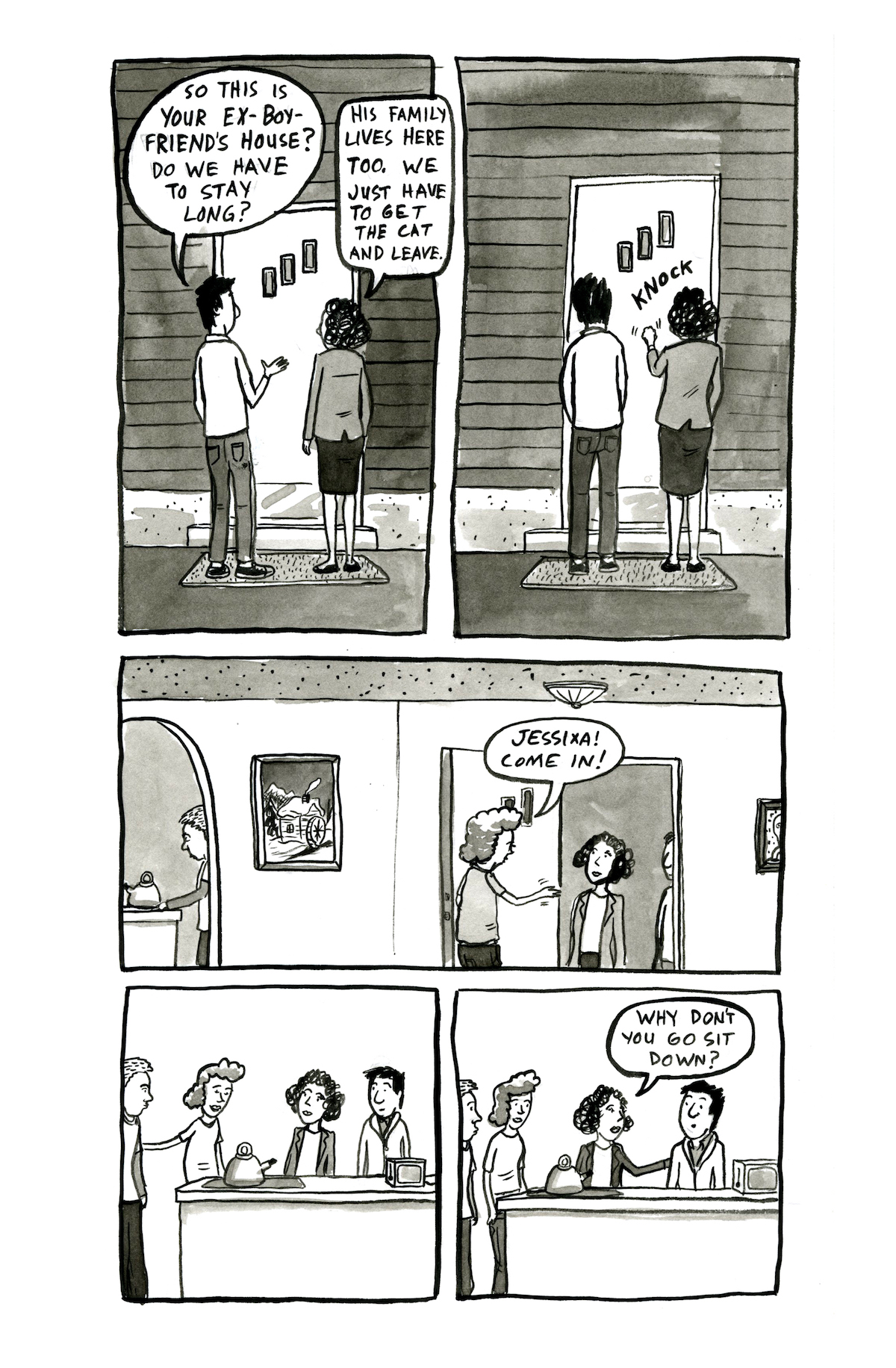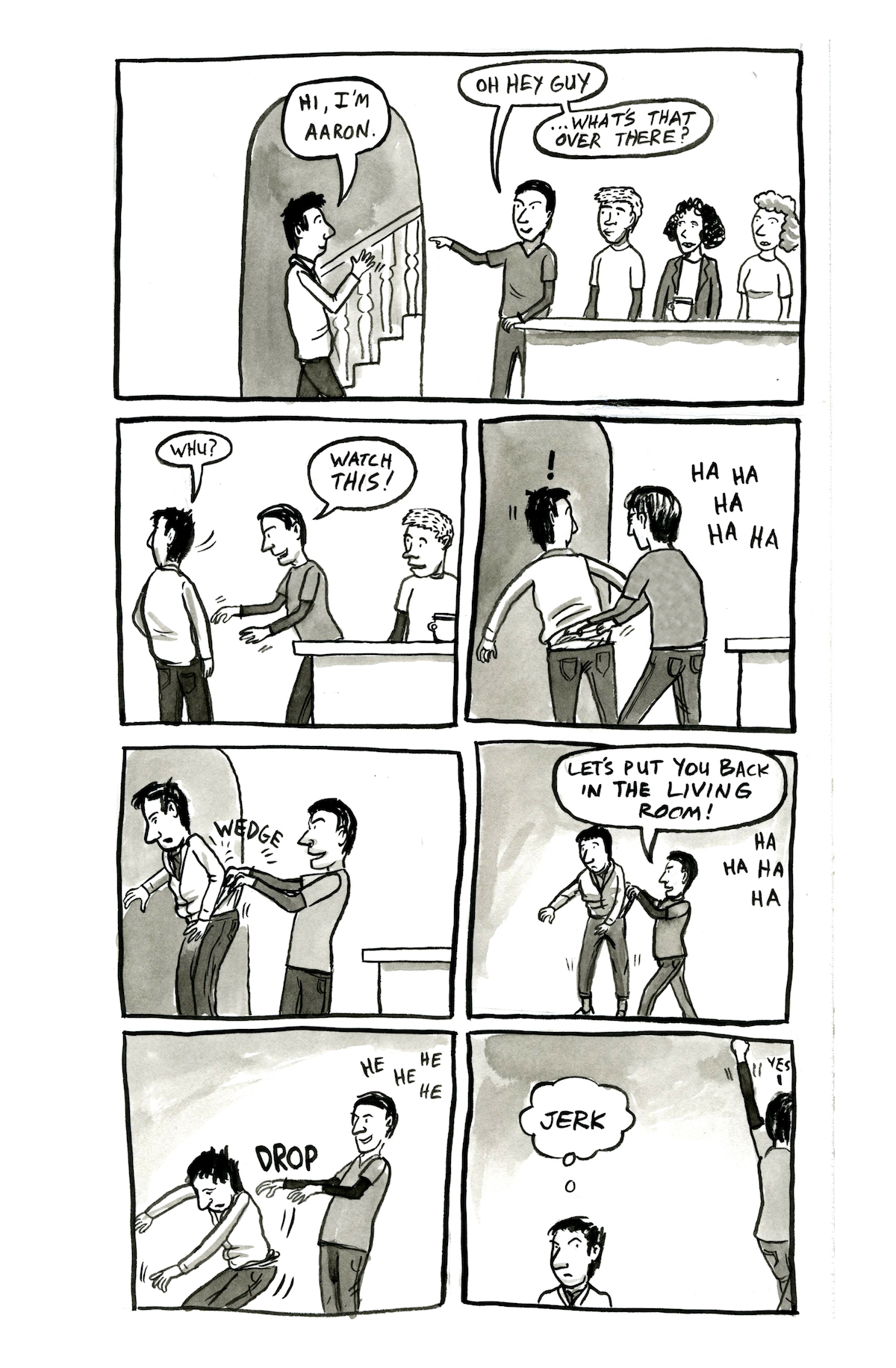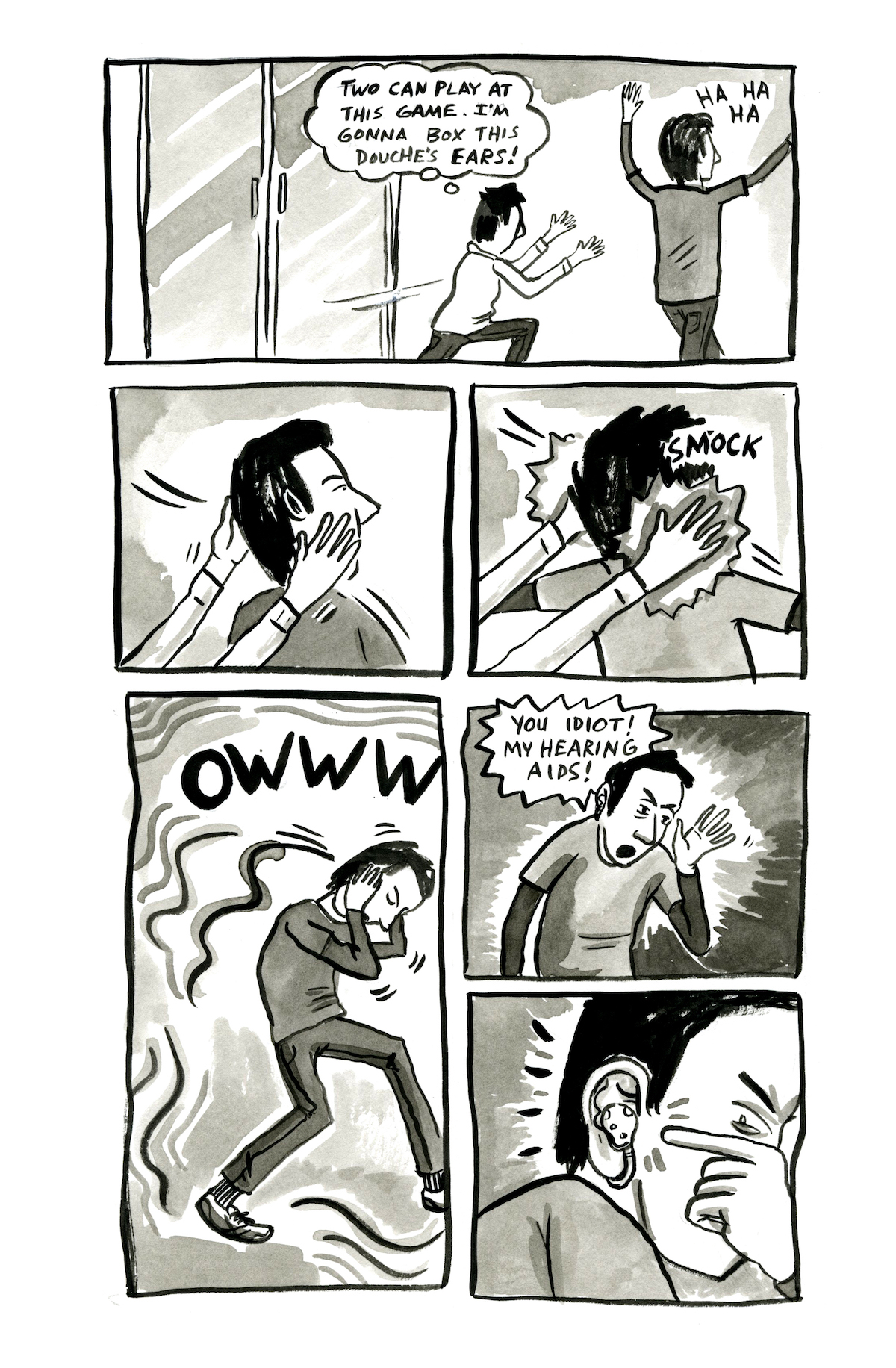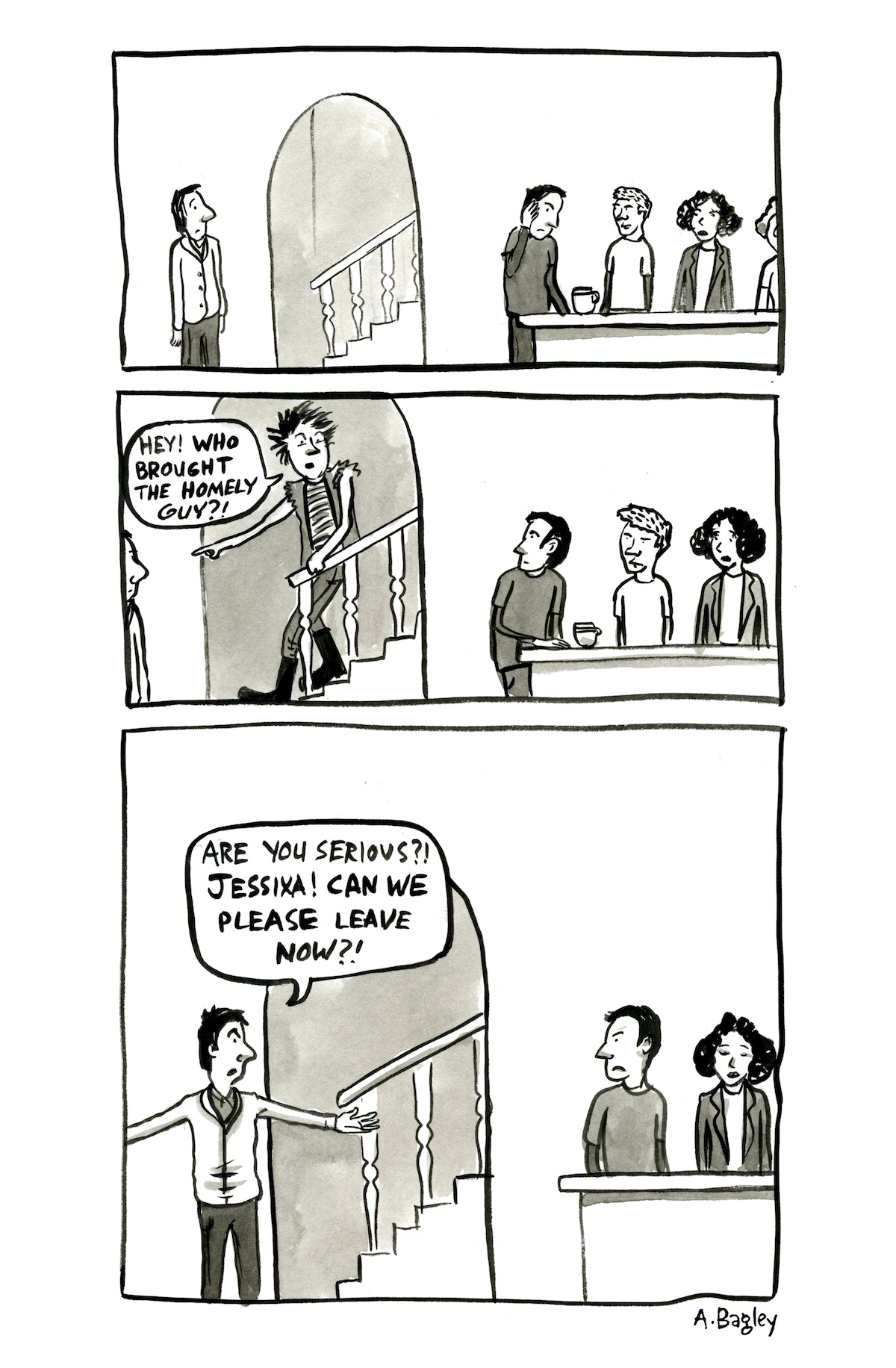Tomorrow night, watch poetry make the jump to the big screen at the Cadence Video Poetry Festival
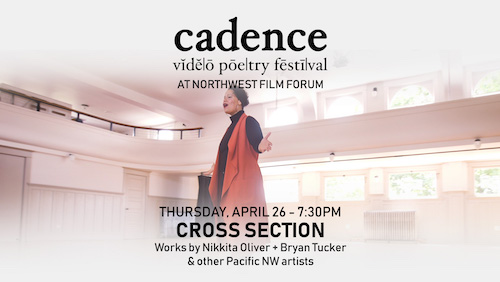
When Seattle author Chelsea Werner-Jatzke started working with Northwest Film Forum to put together a video poetry festival, she recalls NWFF administrators saying that "it'll be really important to define what video poetry is." At the time, Werner-Jatzke recalls, she thought that would be "no problem." But as she worked to curate the month-long festival of screenings and educational programming, she realized that she couldn't easily define the form.
In fact, describing video poetry in words, she says, is really difficult. "It's not a poem that someone made into a video," Werner-Jatzke says. It's a lyrical video, a poem in moving images. Just as you can't throw a bunch of indents and hard returns into a wall of prose and call it poem, you can't just put some images of flowers onto a screen and say it's a video poem. "It's a relatively new art form, as far as writing genres go," she tells me, and there are debates among purists about how far the form can be stretched before it breaks.
Werner-Jatzke's journey into video poetry began about five years ago, when a fellowship at Jack Straw Gallery inspired her to incorporate multimedia work into her writing. "I hadn't set out to make a video poem when I started to make one," she explains. "I had a piece that needed to be a video piece. I guess I was trying to figure out how that fit into my larger writing identity, and that's how I became enmeshed in video poetry."
Tomorrow night, the final screening in the Cadence Video Poetry Festival is taking place at NWFF. In addition to video poems from all over the world, the screening will include new work produced in workshops over the past month at the festival by Northwest artists. Under the guidance of video artists like Gretchen Burger and poets including Nikkita Oliver and Shin Yu Pai, aspiring video poets have learned how to communicate in new media.
"I'm excited about seeing the workshop pieces, as a workshop participant as well as a producer of the festival," Cadence producer Rana San says. "It was cool to see how everybody took to the challenge. Filmmakers who hadn't had faith in their writing started writing, and writers were picking up the camera."
Werner-Jatzke is looking forward to "Triptych," a new work by Barrett White, and a film called "PoemVideo," which she says is "short and sweet, rooted in sound poetry and visually sort of simple in a wonderful way - some visual overlays but carried mostly by the delivery of the text and the music." She also says a new work created by Seattle poets Rachel Kessler, Sierra Nelson, and Britta Johnson will likely thrill audiences, and "Royaltee," by Kamari Bright, "incorporates text elements that add extra meaning to the spoken text she recites in unexpected and powerful ways."
But purists will continue to grumble: is a poem still a poem when it's in a video? Does poetry lose its essential poetry-ness when it's removed from the page? Werner-Jatzke recalls a moment that clarified that question for her at the Cadence festival kickoff screening earlier this month. "Nikkita Oliver pointed out that her writing is generally disembodied from the page," she says. As a spoken word poet, Oliver "doesn't draft on the page," and her poems often don't ever make it to paper. "I had to adjust my own framework" when Oliver said that, Werner-Jatzke says. "I think about literature as the written word, but literature is from a spoken tradition."
It's an enticing thought: If writing could shift in a relatively short amount of time from a spoken tradition to a written one, who's to say that the artists taking part in Cadence aren't helping along the next big evolutionary step?
"These are very scary times"
Published April 25, 2018, at 12:00pm
Comics artist Tatiana Gill's mind is blown, in a good way, by Ijeoma Oluo's latest.
The men behind the masks: How did all that beautiful comics artwork make it to MoPop's Marvel exhibit?
In the Seattle Times last week, I wrote about MoPop's new Marvel: Universe of Superheroes exhibit, an ambitious world premiere of a museum show featuring original comics art drawn by titans of the industry including Jack Kirby, Steve Ditko, John Byrne, and Frank Miller; statues of Marvel's superheroes; interactive exhibits; and paraphernalia from Marvel's movies, television shows, and cartoons. The show is huge - the largest ever assembled at MoPop - and it came together in record time for the institution.
To meet the deadline established by corporate synergy — presumably, this Friday's launch date of Avengers: Infinity War — MoPop assembled Universe of Superheroes in just under a year-about half as long as it takes to put together a typical show. To get a running start, the museum recruited University of Oregon Professor Ben Saunders as chief curator. Saunders tells me over the phone that U of O hired him to teach 16th and 17th century English - "my first book is on the poet John Donne, and I taught Shakespeare for many years" - but he's gradually insinuated his lifelong passion for comics into the curriculum. "I direct the comic studies minor" at the university, Saunders says, "which is, I believe, the first minor of its kind in the country."
In recent years, Saunders curated a series of popular comics art shows at the Jordan Schnitzer Museum of Art in Eugene. His exhibits began attracting national attention, and when MoPop reached out about hosting a show in conjunction with German touring exhibition company SC Exhibitions, Saunders says he considered the opportunity to "play with the extraordinary space and resources" of MoPop "kind of a dream."
This was Saunders's first show for a non-academic setting. Did he find it difficult to balance the corporate edicts of Marvel and the profit motive of SC Exhibitions with his serious love of the medium? "It's a genuine balancing act," Saunders admits. "There are a lot of factors that, as an academic, I don't usually have to think about - things like issues of brand assurance, for example."
Saunders says that Marvel wanted "to make sure that the audience is not going to get confused" by the many versions of characters on display. Of course, no curator of a mass-market exhibit wants their audiences to leave the museum more confused than when they went in. The solution to that particular concern was to do a good job of educating and clearly marking the exhibits. And Saunders managed that with Universe of Superheroes: previous or alternate iterations of long-running heroes - Carol Danvers as Ms. Marvel in the embarrassing 1970s bare-belly costume, for instance, or Jack Kirby's initial sketches of the Black Panther under the name Coal Tiger - are clearly marked as such.
Saunders says the process of reconciling corporate interests with historical importance wasn't a particularly difficult one. "Marvel understands what a museum is," he tells me. "They understand that this isn't about creating a walkthrough infomercial for current products. And frankly, I wouldn't have said yes to it if that's what I thought this was going to be. I would have no interest in doing that."
And Marvel has always had a strong relationship with its own past. "They understand that they have a history, and they're proud of that," Saunders says. Marvel has always self-mythologized its early days, even going so far as to draw Jack Kirby, Stan Lee, and the rest of the company's Bullpen into the comics.
Saunders says one of the secrets of putting a comics art show together is that you need collectors to loan the exhibit comic art from their collections. And "a good rule of thumb," he says, is "you don't want too many lenders. Because the more lenders you have, the more expensive [the exhibit] becomes."
Saunders realized this the hard way. "My first show had 19 different lenders," he says, "and I realized that was a mistake." Logistically, that's a lot of moving parts to track and a lot of personalities you have to keep happy. "What you really hope to do is track down people who are generous and willing to lend from their larger collections, and then, you don't have to go to 30 sources - you can go to between five and ten."
One of Universe of Superheroes's major lenders is Dave Mandel, a lifelong collector of original comics art. Mandel is a comedy writer who has worked on Seinfeld and Curb Your Enthusiasm. He's currently a showrunner of HBO's incredible comedy Veep. "The show wouldn't be happening without him," Saunders says. "Most of the key X-Men pieces come from his collection. Dave has one of the best collections of original comic art on the west coast."
"I was always a comic book reader," Mandel tells me over the phone. "I still am to this day. I go every Wednesday to Golden Apple Comics here in LA. I'm a regular weekly reader still." Back when he was a teenager, Mandel says, he collected comics as an investment. "I thought everything I was buying was going to be worth a billion dollars someday."
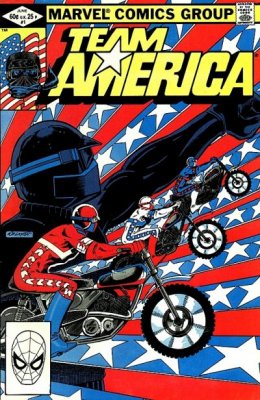
"So I was buying multiple copies of issue one of whatever the new book was, like Team America," he laughs, remembering a 1982 Marvel flop about a super-powered team of motorcycle stunt riders. "Of course, that and a million dollars is worth a million dollars."
"I sort of bumped into [original comics art] by accident" at San Diego Comicon, Mandel says, "and I was just blown away by it."
To hear Mandel tell it, original comics art is the next step after the gateway drug that is collecting comics. "If I own Giant Size X-Men #1, then I have a copy and so do, I don't know, twenty thousand other people. Now, I might have a really nice copy - but so do three thousand people. But years later when I was able to purchase the cover of Giant Size X-Men #1, the original hand-drawn cover by Gil Kane and Dave Cockrum - which is also in the exhibit - that is the only one of its kind. It is the one. And that certainly appealed to my crazy collector genes."
Surely aesthetics played into it, too. What about the art appealed to him? "First of all, I think I'm a little bit of a frustrated artist," Mandel says. "So those who can't, collect." Additionally, "I love seeing the pages, seeing the notations where sometimes the writer would be talking to the artist on the sides, or a note from the artist to the inker, or the artist to the colorist, or even an editor's note." And the imperfections that don't make it to the printed page really appeal to him, too: "I love seeing the corrections, I love seeing traces of the pencils under the ink."
Mandel owns a lot of X-Men pages from the Chris Claremont era - "that X-Men run for me, that was my soap opera. I watched it the way a housewife watched General Hospital" - and Steve Ditko art. But he's not only a Marvel collector. "Just for the record, I do own Batman art. I do own Superman art. So if anyone's looking to do a big DC exhibit, call me."
An exhibit like Universe of Superheroes relies on the original artwork to give the show artistic merit, to remind audiences that this is not just intellectual property - it's real artwork drawn by real human hands. But in the future, original artwork is going to be harder to come by, as more and more artists work entirely on digital drawing tablets. Many comics artists today never put pen to paper as part of their process. "There's a wonderful artist that does a lot of work for Marvel these days by the name of Phil Noto," Mandel says. "And he basically is all digital, and I bug him about it all the time." Noto draws gorgeous covers and interior artwork, but those pages, to a collector, simply don't exist.
Mandel understands why the shift is happening. "I know some older artists that moved to digital because it's easier on their eyes. I know for other guys it can be quicker and faster. Also, a lot of guys they want to draw it, color it, and ink it - on a computer, all those steps are a lot quicker than doing them manually."
But he doesn't have to like it. "As a collector, especially with new stuff, I'll read something from time to time and really fall in love with some new book or new story and go, 'oh, who's this artist?' I'll reach out, and then I'll get disappointed: 'oh, there's no art.'"
Mandel is happy to share his collection of original comics art with the public through the Universe of Superheroes show, but he wonders what the next generation of curators will be able to show the public. He laughs: the all-digital drawing process "will make the sequel exhibit much harder, I guess."
A huge thanks to our sponsors! (Maybe you'd like to join them?)
Have you noticed how great our sponsors have been in the first stretch of this year?
Each week those sponsors not only pay for the reviews, news, and columns we run, but they do it by putting something amazing under our readers' eyes: good content. Be it a great piece of writing, a residency or retreat to help you refine your craft, or a stellar book-related event happening in our fair city, you always know the sponsorships you read here are not just nameless corporations shilling advertising in million dollar increments — they're local writers, publishers, and organizers who make our literary culture run. One sale from you is important to them: one book bought, one ticket sold, one application submitted.
And because we have the luxury of knowing that you reading this loves books (why else would you be here?) we don't have to use creepy tracking to know how to advertise to you. It's honest and fair, and it works for both our readers and our advertisers.
That's why we wanted to take a moment to thank them here, for their investment in the site, and their trust of you as a great receptive audience.
Of course, we'd love for you to become a sponsor, too. We have a few openings left in June and July. We'd love to sell them before we release our block for the second half of the year. Take a look at those dates, or find out more about our sponsorship program.
University of Washington Libraries and Northwest Associated Arts, who brought great events to the attention of our readers.
Mineral School, who spread the word about their amazing, one-of-a-kind residency program, and of course this week's sponsor, the fabulous Chuckanut Writers Conference.
Poetry Northwest, who featured their Winter & Spring issue and shared a broadside by Myrna Keliher of Expedition Press (who you might've read about here not too long ago).
And all of the authors and publishers who told us about their books and then gave us permission to share a chapter, an essay, or a few artful pages on the site:
- Janet Buttenwieser, with her memoir GUTS.
- Joe Ponepinto and his comi-political novel Mr. Neutron.
- Lois Farfel Stark and her photographic exploration of shape, The Telling Image.
- Amphora Editions, with Music To My Years: Life and Love Between the Notes, by Artie Kane.
- Kevin Marshall and the graphic short story Not Really an Emotion.
- Pope Brock, with his timely Charlatan: America's Most Dangerous Huckster, the Man Who Pursued Him and the Age of Flim-Flam.
- Grey Sun Press, with the epic fantasy Amaskan's Blood, by Raven Oak.
- Conon Parks, for his psychedelic noir Some Kind of Ending.
- And Tabitha Blankenbiller, with her "foodoir" Eats of Eden.
Thanks again to all of our sponsors — we're honored and grateful to have had you on the site.
Loyalty to whom?
Published April 24, 2018, at 12:01pm
Should you read James Comey's blockbuster memoir about being fired by Donald Trump? Well, that depends. How do you define greatness?
Conversation
The rain pinched the glass
of the windowpane.The rain’s tiny pelts nagged at the glass
like the conversation
she was avoiding having.The avoidance made her feel
removed from herself
while at the same time even more
introspective.The room in which she sat
was well lit, so outside
looked like asphalt
on a playground’s court.She could see the orange ball,
bouncing lower, lower, lower —
until it stopped.The ball, its visibility, then disappearance,
reminded her
that her words, too, dissolved like this.Or were her words, against the dark,
a bright, bright blue?
Mail Call for April 23, 2018
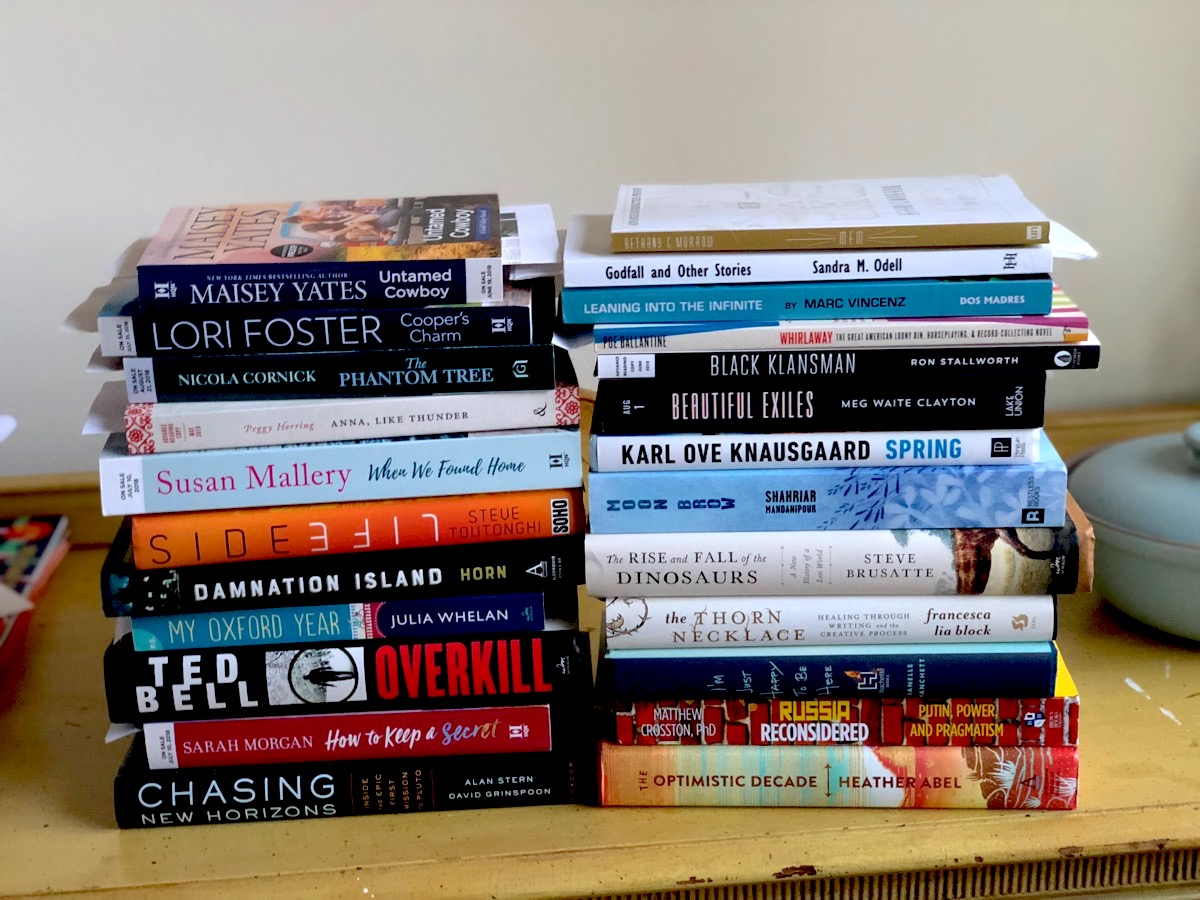
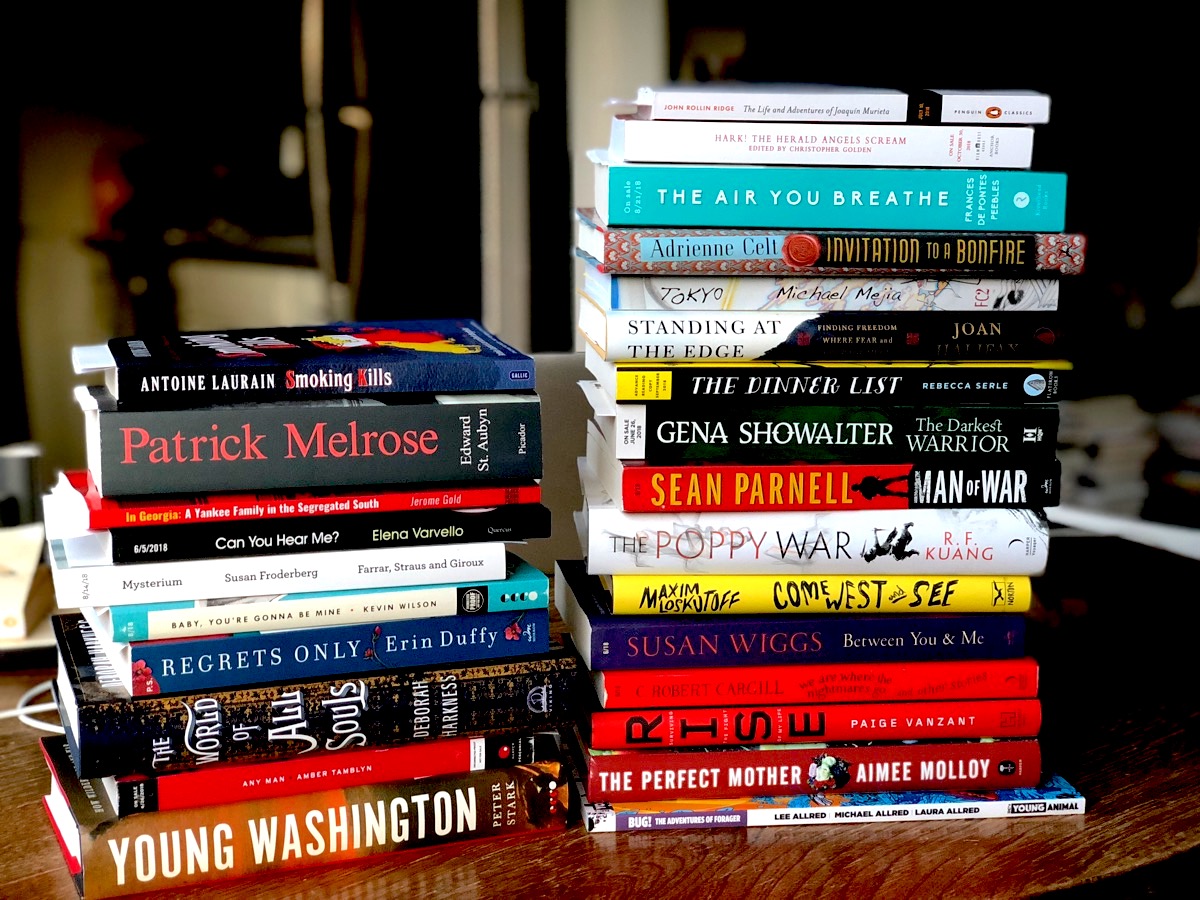
The Seattle Review of Books is currently accepting pitches for reviews. We’d love to hear from you — maybe on one of the books shown here, or another book you’re passionate about. Wondering what and how? Here’s what we’re looking for and how to pitch us.
Take advantage of earlybird rates at the Chuckanut Writers Conference!

The conference's 2018 theme — "inspiration into action" — captures what they're trying to do: not just get you thinking creatively, but help you get your work on the page and out into the world. This year's keynotes are impressive; Claudia Castro Luna, Washington's Poet Laureate and one-time Chuckanut participant, is one. Here's what she had to say about the experience:
The Chuckanut Writers Conference was very fruitful for me. The workshops were varied and interesting, and I made connections that I have to this day. Bellingham is such a beautiful place, and it was all around very inspiring.
Natalie Goldberg, of the immensely beloved Writing Down the Bones, is also keynoting this year. These two accurately represent the quality of the faculty list — check out a few more names and get links to full information on our sponsorship page. Through May 22, registration is discounted — only $245 — so we suggest you move quickly.
We're grateful to the Chuckanut Writers Conference for supporting the writers who publish here every week and for making sure our readers know about events like this. We'd love to add you to our community of sponsors, too. Find out more and check out available dates here.
(Photo: Jordan Steranka.)
Your Week in Readings: The best literary events from April 23rd - April 29th
Monday, April 23: How to Write an Autobiographical Novel Reading
Celebrated novelist Alexander Chee's debut essay collection, How to Write an Autobiographical Novel, was one of the spring's most anticipated books. Now it's here, and he's here, and the fabulous Mattilda Bernstein Sycamore will be interviewing him. Hugo House, 1021 Columbia St., 322-7030, http://hugohouse.org., 7 pm, free.Tuesday, April 24: Four Seattle authors
Four Seattle authors who recently released new books get together to talk about their experiences. Panelists include Natalie Singer, author of California Calling; Jennifer Haupt, author of In the Shadow of 10,000 Hills; Anca L. Szilagyi, author of Daughters of the Air; and Priscilla Long, whose most recent solo title is Minding the Muse. This should be a fascinating conversation, particularly if you're interested in being a published author. University Book Store, 4326 University Way N.E., 634-3400, http://www2.bookstore.washington.edu/, 7 pm, free.Wednesday, April 25: On Edge Reading
Earlier this month, I interviewed Expedition Press founder Myrna Keliher about her show On Edge at Core Gallery. It's an exhibition of Keliher's Broken Broadside series, which is intended to be "propaganda for poets." Tonight, poets whose work has been presented in the show will read the full poems that are excerpted in the series. This should be a fun mixture of visual art and poetry. Core Gallery, 117 Prefontaine Place S, 467-4444, http://coregallery.org, 7 pm, free.Thursday, April 26: Engage
According to press materials, "Engage is a program where University of Washington graduate students build their skills of communicating with the public about their work." Sounds fascinating! Speakers will discuss topics like microneedles, quantum computing, and climate change. There are few things in the world as inspiring as very intelligent young discussing their favorite subjects. Ada's Technical Books, 425 15th Ave, 322-1058, http://seattletechnicalbooks.com, 7 pm, $5.
Friday, April 27: Four Way Books Showcase
Four Way Books is a nonprofit publisher of poetry and short fiction. Tonight, they present four of their latest authors. Nathan McClain's Scale is a poetry collection about sons and fathers. Rest by Margaree Little is a poetry collection about the 253 dead bodies found on the Arizona-Mexico border in a year. Carol Moldaw's book of poems, Beauty Refracted, is about time and grief and loss. And Bruce Willard's Violent Blues is billed as "a blues-harp album of words." Hugo House, 1021 Columbia St., 322-7030, http://hugohouse.org., 7 pm, free.Saturday, April 28: Independent Bookstore Day
See our Event of the Week column for more details. See https://www.facebook.com/SEABookstoreDay/ for more information.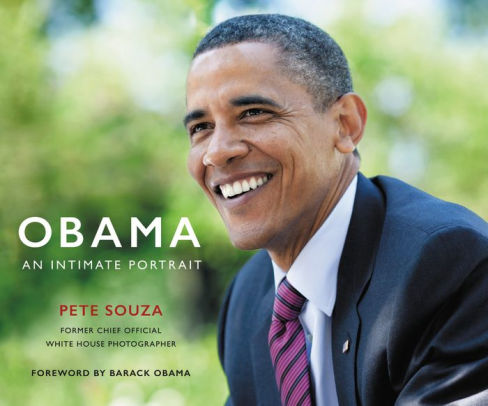
Sunday, April 29: Pete Souza
The last time Obama's official White House Photographer came to town to promote his book of Obama photographs, his book was sold out everywhere and the audiences were entirely insane. Now, he's still a crazy-popular author, but Elliott Bay is sure to still have copies of the book available for sale. Come get nostalgic for a time when adults ran the country. The Moore Theater, 1932 2nd Ave, http://elliottbaybook.com, 7 pm, $57.Literary Event of the Week: Independent Bookstore Day
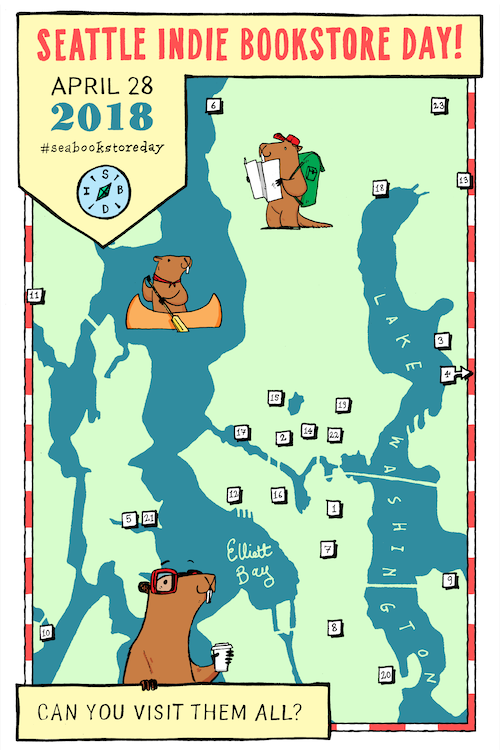
This Saturday, you should prepare yourself for the best independent bookstore celebration day of the year (at least until next Saturday's Free Comic Book Day and this November's Small Business Saturday.) Yes, it's Independent Bookstore Day, in which area bookstores offer up bargains, freebies, and special events to anyone who visits. (Earlier this month, I talked with the owners of two small local indie bookstores, Burien's Page 2 Books and Bothell's Neverending Bookshop, about their plans for the day.)
Independent Bookstore Day is intended to start a national conversation about the importance of independent bookselling, and it's pretty hardcore: hundreds of Seattle-area folks will be racing around the region in an effort to visit all 19 participating bookstores and get their special passports stamped. Everyone who succeeds in this mission will earn 25 percent off all purchases at every one of the bookstores for the next year. If you don't want to devote a whole day to driving around the region, you can get stamps from three bookstores and earn a one-time 30 percent off at any participating bookstore.
There will be a bunch of special items available on Saturday, including a broadside with art representing all the participating stores and a literary map of Seattle. Additionally, audiobook retailer Libro.fm-a wonderful site that partners with independent bookstores-will be offering several free audio books and samplers for download.
You're on this site, so you probably don't need me to lecture you about why bookstores are among humanity's greatest inventions. But you might need me to remind you that, even in the midst of a fairly dreary spring, it's important to show up for Seattle's Independent Bookstore Day, to be counted as a supporter of the amazing resources that our region enjoys. We're all on the same team, here. Now let's show up for each other.
See https://www.facebook.com/SEABookstoreDay/ for more information.
The Sunday Post for April 22, 2018
Each week, the Sunday Post highlights a few articles we enjoyed this week, good for consumption over a cup of coffee (or tea, if that's your pleasure). Settle in for a while; we saved you a seat. You can also look through the archives.
Old Friend
Poet, translator, and activist Press Sam Hamill died last week. The AP obituary recaps the public story of his life: He was raised in Utah and found a calling for poetry in San Francisco, after rough teen years marked by heroin addiction and violence. He co-founded Copper Canyon Press, with Hugo House’s Tree Swenson and Bill O’Daly, in 1972, establishing a PNW publishing presence that drew names as big as any coming out of the New York houses. He was outspoken and anti-war, famously refusing an invitation to the White House from Laura Bush in 2003 — this irritable article from the time by Joseph Bottum is a reminder that poets can get under our nation’s skin.
That’s the public story. The private story is playing out over hundreds of recollections of Hamill’s influence on his friends and writers here in the Pacific Northwest and beyond. These seem, somehow, a better representation of what he really achieved. For example, the verse tribute by Hamill’s friend Paul Nelson in Cascadia Magazine, whose opening lines I’ll excerpt here:
We wander through asphalt riparian zones
until it hits each of us: it IS later than we thought.
Another quick trip between this veil of soul-making
and complete re-calibration to the ultimate mystery.
How much is a word worth?
Malcolm Harris charts the declining pay for freelance writers — not just the up-and-comers paying their dues, but writers at the top of their game, selling pieces to internationally known publications. Without any way to influence rates collectively (or health insurance, which I hear is a good thing to have) many move on, to television, for example, or other in-house jobs that use the same skills to an arguably less noble end. But the brilliant little bit of math below shows the more insidious outcome: the calibration of quality to pay, with a decrease in one correlating directly to the other.
I was assigned this story at $4,000, and I turned in a draft of 4,000 words. Another site offered me $850 for the idea, and there is an $850 version of this story that is significantly shorter, with less research, and of a weaker quality overall. (If that sounds cold or unprofessional, imagine what the effect on the quality of your work would be if your boss cut your pay by 80 percent.)
There is also a $2 a word version that has more background research—in physical, not just digital archives—and for which I would have been more willing to press my sources to take risks and talk to me on the record.
I imagine a $4 per word version would include the specific, surprising allegations about the labor practices of particular beloved media institutions, the printing of which likely would make it difficult for me to find work for a while, but that would be fine, because I could live off that check for six months.
"One Has This Feeling of Having Contributed to Something That’s Gone Very Wrong"
New York magazine has been running a series of interviews called “The Internet Apologizes” — reflecting our belated realization that trusting a vast uncanny technological network with our emotional, social, and financial well-being was perhaps not such a great idea after all. This one, with virtual reality pioneer Jason Lanier, is interesting (if a little reactive) for how it charts the the social and economic stratification of the tech-nerd class. What happens when the formerly powerless suddenly own the world?
When you move out of the tech world, everybody’s struggling. It’s a very strange thing. The numbers show an economy that’s doing well, but the reality is that the way it’s doing well doesn’t give many people a feeling of security or confidence in their futures. It’s like everybody’s working for Uber in one way or another. Everything’s become the gig economy. And we routed it that way, that’s our doing. There’s this strange feeling when you just look outside of the tight circle of Silicon Valley, almost like entering another country.
Whatcha Reading, Jez Burrows?
Every week we ask an interesting figure what they're digging into. Have ideas who we should reach out to? Let it fly: info@seattlereviewofbooks.com. Want to read more? Check out the archives.
Jez Burrows has just released his first book of short stories, Dictionary Stories, in which he also invented a new form: assembling short stories from Dictionary example sentances. (I liked the book quite a bit). He's a writer, illustrator, and designer. He, a Brit, lives in San Francisco.
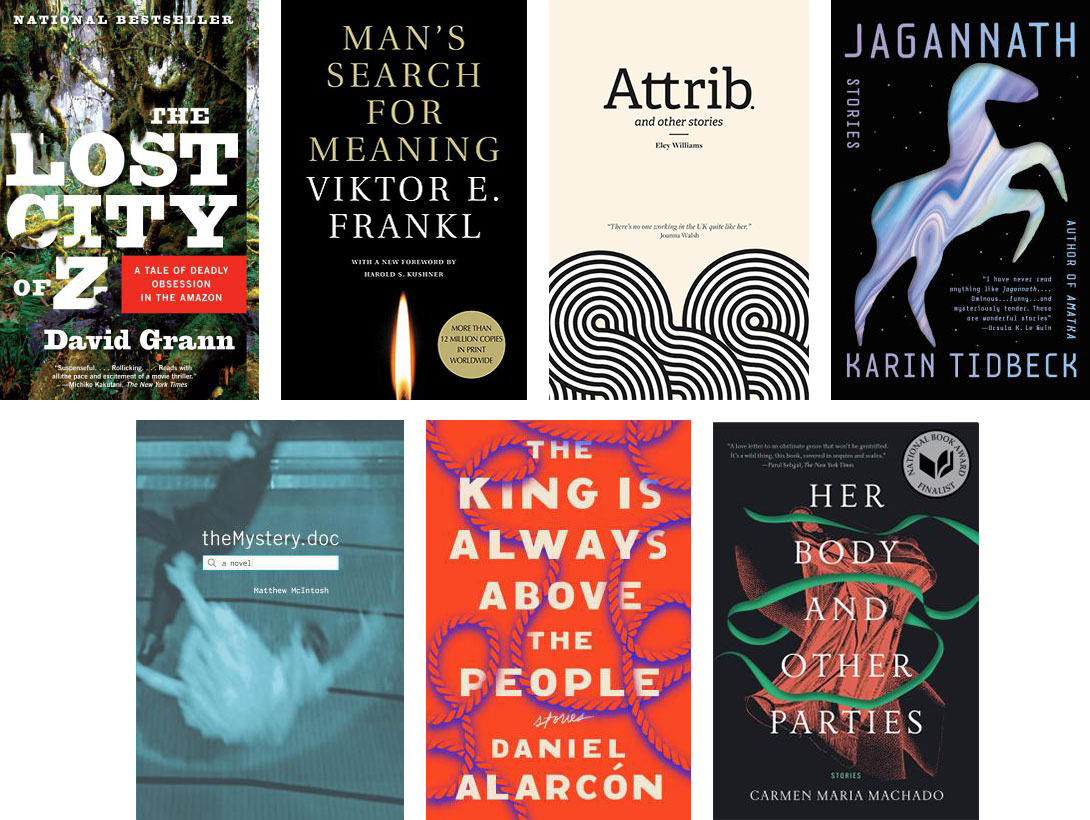
What are you reading now?
I’ve accidentally ended up in the midst of two books about people in search of apocryphal or spiritual MacGuffins. The first is David Grann’s ‘tale of deadly obsession in the Amazon’, The Lost City of Z, in which he attempts to retrace the steps of the British explorer Percy Fawcett. I’m a sucker for doomed expeditions and jungle-bound lost cities, so I’m practically inhaling the thing. The second is Man’s Search for Meaning, Viktor Frankl’s story of surviving the concentration camps of WWII and developing his approach to psychotherapy as a result. Impossible to summarise neatly without sounding glib or reductive, but I can tell it’s a book I’ll want to revisit frequently.
What did you read last?
Two totally remarkable short story collections. I suspected I might be in love with Attrib. and Other Stories by Eley Williams almost immediately, but knew it was true when I read, “I am the first to admit my spirit animal is probably a buttered roll,” or maybe, “What’s a sentence, really, if not time spent alone?” It frequently reminded me of Ali Smith, another writer who wears a playful love of language on her sleeve — they both reel you in with wordplay, only to completely blindside you with their lyricism. I also loved Karin Tidbeck’s Jagannath, which is another slim and unassuming collection that completely took me by surprise. Profoundly strange and skin —crawling shorts that deal with gender, suicide, love, Scandinavian folklore… plus, there’s a particularly lovely coda about Tidbeck translating her own work from her native Swedish into English.
What are you reading next?
All 1660 pages of Matthew McIntosh’s theMystery.doc have been looming over me for months so it’s probably time to take a deep breath and dive in. There are a couple more short story collections in the pile, too: Daniel Alarcón’s The King is Always Above the People and Her Body and Other Parties by Carmen Maria Machado.
The Help Desk: Librarian.exe is not responding
Every Friday, Cienna Madrid offers solutions to life’s most vexing literary problems. Do you need a book recommendation to send your worst cousin on her birthday? Is it okay to read erotica on public transit? Cienna can help. Send your questions to advice@seattlereviewofbooks.com.
Dear Cienna,
I’m lucky enough to have a library branch within five blocks of my apartment. I use it all the time.
The other week, I was visiting the library. It was very slow in there; maybe one guy at a computer and a teen reading a comic in the kid’s section. When I went up to the person behind the counter to check out a DVD and a book, she wordlessly pointed to a self-checkout kiosk.
I was a little annoyed by this. Cienna, I know libraries aren’t bookstores and I don’t expect stellar “customer service” from them. But is it too much to expect a little bit of a human interaction from my library visits?
It seems like everyone is automating their customer experience, and it drives me nuts. I’d prefer to have my libraries staffed by human beings, not by reshelving robots. Am I expecting too much?
Todd, [neighborhood withheld to avoid incriminating a library staffer]
Dear Todd,
In situations like this, I like to use my imagination to be as generous as possible to human irritants. Perhaps said librarian was having a particularly nasty battle with her hemorrhoids that day, or perhaps her spiders had just served her with an eviction notice because she still won't shut up about Jill Stein. People, especially those working in customer service, should be given leeway to have bad days – perhaps she was trying to spare you hers.
That said, if the pattern continues, I suggest next time telling the librarian you are allergic to laser beams and politely making her do her damn job. Having a laser allergy should be completely credible hypochondria in Seattle at this point, but if she questions you on this – which she shouldn't because unlike Jill Stein, she is no doctor – offer to give her a urine sample. I have found that most people stop asking me stupid questions the moment I rebut them with urine.
Kisses,
Cienna
BONUS QUESTION:
Dear Cienna,
I have a friend who is always trying to do something weird with books. Like, he was really into internet experiments with choose your own adventures, and hypertext. Then, he obsessed over House of Leaves, and wanted to make something similar: Book formatted so that you have to turn it around and upside down and leaf back and forth. He longs for multiple text colors, complex fonts, and gold leaf foil-stamps on his blind embossed cover.
He also can't tell a story. If he wrote this email it would be twenty-thousand words, most of them too boring to read. I don't have a question. I'm just sick of his shit and wanted to tell somebody.
Sheryl, Shoreline
Dear Sheryl,
I have a friend who is always trying to fuck her sister's husband, like this weekend for example. I envy your taste in human friends. Do you perhaps want to trade?
Kisses,
Cienna
Portrait Gallery: New Books
Each week, Christine Larsen creates a new portrait of an author for us. Have any favorites you’d love to see immortalized? Let us know
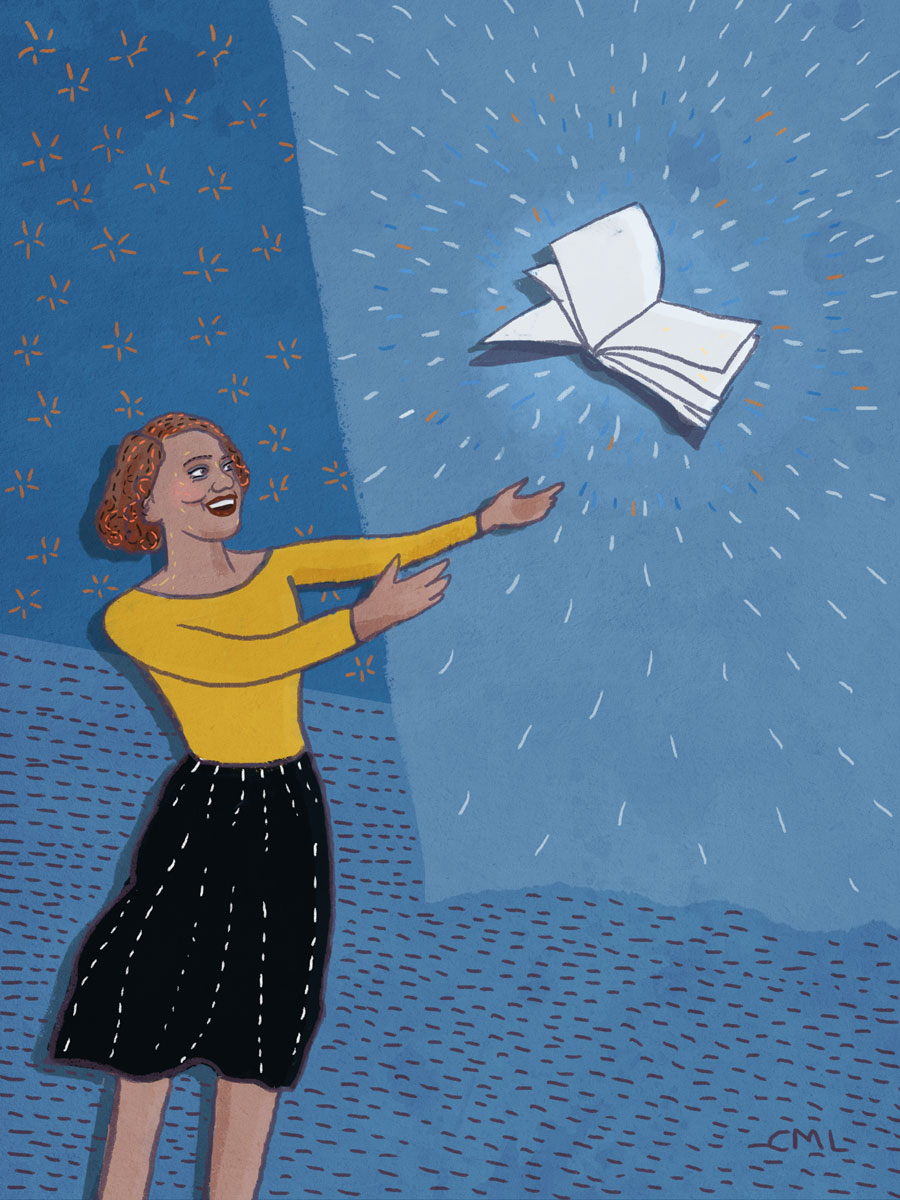
Thursday, April 19: Dock Street Salon
Two local authors who have published new novels in the last few months, Anca Szilágyi (author of Daughters of the Air) and Ross McMeekin (author of The Hummingbirds), will read and discuss what it’s like to publish a new book.
Phinney Books, 7405 Greenwood Ave. N, 297-2665, http://phinneybooks.com, 7 pm, free.
Book News Roundup: SIFF debuts with a book-themed film next month
- This is pretty neat: The opening night film at the Seattle International Film Festival will be The Bookshop, which is an adaptation of Penelope Fitzgerald's popular novel about a widow who opens a bookshop and teaches a town to love literature. It's directed by Isabel Coixet and it stars Emily Mortimer, Bill Nighy, and Patricia Clarkson. The film will screen at McCaw Hall in Seattle Center on the first day of the festival, May 17th. Here's a trailer:
Seattle Transit Blog is hiring a reporter.
Hallie Golden writes at Crosscut about an American Sign Language production of A Midsummer Night's Dream at 12th Avenue Arts.
We live in 2018, and Pen America has to condemn threats against left-leaning bookstores.
“Political disagreements are one thing. Threatening to burn down a bookstore is another, and is unacceptable,” said Summer Lopez, Senior Director of Free Expression at PEN America. “While protests and calls to boycott are of course free and protected speech, that is no excuse for threats, violence, or sustained harassment. Now more than ever, we need to recognize and cherish the right of bookstores to offer books with diverse points of view from across the political spectrum.”
Thursday Comics Hangover: Nancy gets fancy
On April 9th, a new cartoonist using the pseudonym "Olivia Jaimes" took over the daily Nancy newspaper comic strip.
The Nancy strip has often been a bastion of anti-art. Ernie Bushmiller's original Nancy comics were always so vacant in plot and in ambition that they practically demanded readers to fill them with meaning. They looked so clean and neat and geometric that they appeared to be untouched by human hands, and the behavior in the strips bore no resemblance to real life. Nancy and her friend Sluggo didn't act like people. They acted like characters in comic strips. They went to soda fountains and hung around butcher shops. They said things that could only make sense if you were saying it to telegraph a punchline in a comedy bit.
The Nancy strip has always been a postmodern joke about comic strip jokes, a strange antiseptic world so generic that you wouldn't be surprised to find that Nancy's word balloon in the last panel of any given strip read "INSERT PUNCHLINE HERE." After Bushmiller passed away, artists like Jerry Scott and Guy Gilchrist tried to capture Bushmiller's odd sense of humor, but they mostly succeeded in creating a generic comic strip about a little girl who was kind of a dick and her weird dumb bald friend.
Jaimes, though, adds something new to the strip: a perspective, style, and voice. Most of Jaimes's strips so far have had to do with modern life. There's an awkward earbud joke, and a few jokes about social media. (In one self-referential panel, Jaimes intrudes to say that "Any questionable art from now on is because Nancy and Sluggo are using a Snapchat filter.") But the best of the strips trade on Nancy's long history of self-absorption. Nancy admits to Sluggo that her goal in life is "to be famous without having to work," for instance.
My favorite of Jaimes's work so far was published on Tuesday, and it manages to combine Nancy's horrid lack of self-awareness with a fairly up-to-date topic: social media bots.

That last panel, with Nancy's resentful face and the absurdity of Sluggo-bot, is just about perfect. Obviously, real people directly in front of you can't be bots, but Nancy can't fathom dissent and so she questions her friend's free will. You could almost picture our president appraising a reporter with this same entitled sneer on his face.
Nancy fans — and yes, there were some — naturally hate the new stuff. On the sit GoComics, Lambert2015 commented on the above strip:
I just can not get into the new Nancy..just not what I enjoy reading with my breakfast. Bye, I will unfollow this comic
And someone named Chirp writes:
I don’t like this crap and just unfollowed this destruction of a 70 year old comic strip. Millennials, IF they read comics, will LOVE the fact that the RACE of 1 of the main characters has now been changed. I wonder when their sex lives will?
I have no idea what Chirp is talking about with regard to race — perhaps they're referring to the strip's new color palette, which uses more browns and yellows than past Nancy strips? If so, yikes.
And the complaints just keep coming. A user named JLG complains, "So far, this new version of Nancy seems rather unfocused and hard to really sink your teeth into," as though you could really devote three or four hours to the substance of a single Nancy strip by Gilchrist or Bushmiller.
Any change on the comics page always evokes a litany of complaints from hardcore fans. Comic strip followers seem to be a pretty conservative bunch, and they absolutely hate change. But the hate Jaimes is receiving is something else again — you'll find a lot of men in the comments raging against her and claiming that she was just an affirmative action hire and needs to be replaced, presumably by a man, immediately.
As for me, I'm a big fan of Nü Nancy. I think the strip is calling back to Bushmiller's bone-dry sense of humor, and Jaimes's idiosyncratic art is endlessly appealing. She's got Bushmiller's sense of minimalism down, but now Nancy looks like an alternative comic. It's a vastly different interpretation than Bushmiller's — weird and wavy as opposed to angular and antiseptic — but it works perfectly in this most meta of comic strips. I'm willing to bet that in six months, the haters in the comments will either have moved to a conservative comic strip (do they still make Mallard Fillmore? If so, why?) or they will have died of old age. We're seeing the eternal struggle between baby boomers and millennials playing out on the comics page, and the sheer weight of time indicates that you should probably put your money on the younger of the two.
Read all about the new Hugo House
Lora Shinn at Poets & Writers offers up the most enticing description of the new Hugo House space that I've encountered:
The interior of the building will be full of surprises and unconventional design elements. Each classroom will be constructed of different materials, including wood plank, cork, and frosted glass, with dry-erase walls for impromptu class notes. The house will also feature “staircases to nowhere” and benches that double as bookcases. A “pencil wall” in one classroom will hold hundreds of pencils. Curated quotes from Richard Hugo will be hidden around the building: near electrical outlets, at the edge of a restroom mirror, or in peekaboo windows. “You might find a quote on the ceiling,” Mullenix says, “and it will hopefully encourage people to come back.”
I can't wait to see some of these touches in person. Those who were complaining about Hugo House becoming a generic new building might wind up eating their words. If you'd like to help make this space into a reality, you can donate to the Hugo House online.
Conflict of interest alert: Nisi Shawl to publish middle reader novel next fall
Yes, Seattle novelist Nisi Shawl is a columnist on this website, and that is a conflict of interest. But dammit, I squealed when I read this tweet, and you should get excited, too:
the great @NisiShawl is blazing a trail into middle grade fiction yessssssss pic.twitter.com/nUfCwH9EXA
— Saladin Ahmed (@saladinahmed) April 17, 2018
When Shawl published Everfair a year and a half ago, I worried that we'd have to wait five years or so for her next book; thankfully, I was wrong by almost half.
Bring your own book to Book Club, the most literary improv show in the known universe
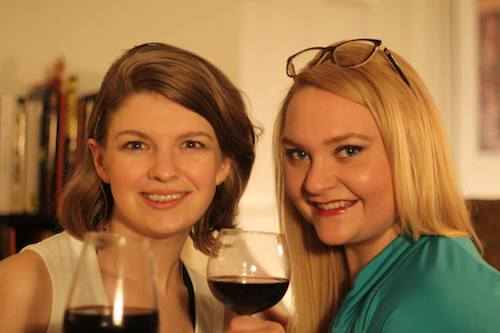
Alison Luhrs (left in the above photo) and Amalia Larson (right) regularly perform an improv show called Book Club, in which they play a pair of "shallow, well-off adults discussing a book supplied by the audience while consuming a massive amount of wine." Their next performance is this Sunday, April 22nd at 5:30 pm at the Pocket Theater. In this interview, they discuss the books that they've most loved to riff on, the books they most love in real life, and what you should expect from Book Club if you've never attended in improv show before.
This is such a great idea for a show-I imagine getting good audience suggestions is one of the most tricky things about improv, so it seems like the books must help to focus the show. Could you explain the premise in your own words? And did this show's premise evolve, or did it come to you fully-formed?
ALISON: Book Club is about extraordinarily priviliged, trend-obsessed people with zero self-awareness trying to use literature to relate to their lives. We get a book from the audience, and the premise of the show is that we are the only two members who remembered to show up to their monthly book club meeting. We then crack open a bottle of wine (dry and slammable is our go-to) and pretend we've read the book before reading passages out loud. The passages serve as a launching-off point for the characters to talk about their lives and occasionally have profound revelations about the way they see the world. The book provides us thematic direction that always gives the characters something new to connect with. The women we play are sometimes secret shoplifters, sometimes cheating on their husbands, sometimes falling in love with each other, sometimes addicted to painkillers, but always contain a secret depth. They're the kind of people who use acai bowls and soulcycle classes to show the world how put-together they are when everything is falling apart.
The show concept originally came from Amalia and I making fun of trend-obsessed mommy bloggers, which quickly devolved into us revealing tragic backstories for imaginary people we were just making fun of. Seattle's Improv scene is having a real explosion of experimental unscripted theatre right now, and we've been performing together for ten years, so the show felt like it would be fun!
AMALIA: Yeah, the show itself has evolved some and obviously the content is different every time, but the premise has pretty much always stayed the same. As we were starting to really get into it riffing on this idea, we discovered that there is basically endless material to be found within the archetype of these vapid, secretly desperate, moneyed women. We could throw these characters into a slice-of-life type setting with just a suggestion for an idea from the audience and there would be plenty to run with (or Zumba with, or Kegel with, pick your poison), but having the addition of the book from the audience keeps the surprises coming in real-time for us and gives us a device to build tension, break it, give a moment a button or an ally-oop, and even lovingly throw each other under the bus once in a while. We've got to stay on our toes after all.
I used to run the book clubs at Elliott Bay Book Company, and it seems as though "book club ladies" are a relatively easy target for mockery. There are a ton of easy book club jokes in pop culture-mean-spirited jokes about rich white ladies who drink a lot and can barely read, which doesn't reflect the reality of book clubs as I know them. You play with these expectations but you don't come from a place of superiority. How do you manage to avoid the cliches and find something worthwhile to investigate in your characters? Have your relationships with the characters changed over time?
ALISON: The best part about comedy is being able to trick an audience into caring about someone they were just laughing at. Flipping the power structure not just onstage, but between how the audience views the subject. Our women are wealthy, fixated on appearances, but at their core are desperate for meaning and connection. One of my favorite devices we use in the show is that we allow for one or two 'drops' -- moments when one of the characters will have an honest-to-god deep thought, only to be broken out of the trance a moment later by the other woman purposefully changing the subject. It's totally uplifting and deflating at the same time, and is born entirely out of a character choosing to be introspective for possibly the first time in their life, all thanks to whatever text they were just reading a passage from. We adore these characters, and I think we can mock their pretentions without mocking their personhood. All people are worthwhile, even the ones you avoid when you go to Whole Foods.
AMALIA: I feel like those clichés are a gift! Everyone knows exactly the type of people these characters are referring to which makes it so fun to use the known aspects of the stereotype as a spring board. Moments of shallowness or obliviousness that play directly into the stereotype make people laugh because they feel spot-on or eyeroll-inducingly familiar, but moments that truly break the clichés and reveal something of more substance are disarming specifically because they are unexpected from these characters you thought you knew so well a minute ago. When the armor is polished to perfection, it's that much more surprising to find the cracks. Being aware of where we're playing in relation to those edges, I would say, is a huge part of the fun. But at the end of the day, the most important part is that it all comes from a place of love rather than ridicule. These women care so earnestly about who and what they care about, that's where the humanity lies, but what they care so much about is, you know, designer yoga mats and who brought the best snacks to the peewee lacrosse championship, that's where the comedy lies.
Have you ever belonged to a real book club? What books do you like to read?
ALISON: I make fantasy games for a living, so staying up on my SFF is important. I subscribe to Uncanny Magazine for SFF short stories, and survive otherwise on a steady stream of Tor novels. All that magic and wonder can be a bit overwhelming at times, though, so I also try to dabble in nonfiction to cleanse the palette. I recently finished The Only Harmless Great Thing (which if you like alt history with radioactive elephants is a real gem) and am about halfway through I'll be Gone in the Dark, so I'm sort of all over the place with my reading list.
AMALIA: Honestly, I read almost exclusively nonfiction, I'm kind of a creature of habit like that. My favorites are usually either research-driven social science - most recently Bonk by Mary Roach and The Power of Habit by Charles Duhigg, or personal essays and memoirs like Sloan Crosley and Augusten Burroughs and anything ever by any Sedaris. I try to keep up on the books my favorite comedy folks write too-the Oswalts and Poehlers and Martins of the world. It's good to have role models. And this show is the only book club I've ever been a part of so far, but I'd be down.
Do any books make repeat performances in the audience? Are there any books you maybe wish you could ban from the show, or that you've mined to the point of diminishing returns?
ALISON: We've never had a repeat book! We've done Starship Troopers, The Fish Won't Let Me Sleep, even a physics text originally written in Japanese and translated into English. With that last one we learned the hard way that academic texts don't necessarily make for funny passages.
AMALIA: I don't know though, we had that one really thick textbook from the seventies about family psychology and that was a pretty good one. I keep waiting for someone to bring in like a dictionary or a bible or phone book or something (they still do phone books, right?). I'm sure we'd make it work, but that would definitely be a curveball. It's more fun and we find weirder stuff when we just pick something arbitrarily and it turns out to be way out of left field.
What are some memorable books you've worked with? Is there a formula for choosing a good book to work with?
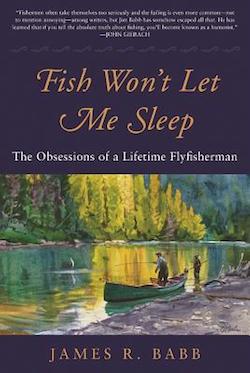
ALISON: The best ones are the weird ones. Fish Won't Let Me Sleep had a lot of passages about spawning patterns, which is just about the deepest well in comedy, so that was great.
AMALIA: Fish Won't Let Me Sleep, FOR SURE. I think if anything, the formula is just to not overthink it. If you just pick that random historical fiction novel your uncle gave you that one Christmas that you've never read, odds are good that's gonna be the real winner.
I recall being intimidated before I attended my first improv show. Do you have any advice for SRoB readers who are considering coming to your show who have maybe never attended an improv show before?
ALISON: There is nothing worse than invasive improv. Having a stranger demand you answer questions and possibly get onstage is THE WORST THING EVER, and it's okay to hate things that are invasive and terrible. A good performer will always ask, will never touch, and isn't going to bother you if you don't want to be bothered with. Volunteering a friend never works either -- that's always a cue for me to swoop up the obnoxious friend who did the pointing.
The good news is that you won't have to worry about that with our show! Seattle's please-don't-talk-to-me attitude applies to our improv scene, too, and the nice thing about improv in the Pacific Northwest is that in our theatrical community we like our shows to feel like plays (it's something that really sets our scene apart from the rest of the country). If we can make you forget we never memorized lines, we've succeeded. All you need to know if you see our show is that at the beginning we'll ask the audience if they would like to let us borrow a physical book for an hour. We'll collect the book, and then the show will start! And we'll never ask you a question again for the rest of the show! Hooray! A good rule of thumb in improv is that you don't need to yell unless someone on the stage asks the audience a question. We also recommend the audience buy some wine from the concession stand and drink along - it'll only make us funnier. Come expecting to watch a play, because that's what unscripted theatre is!
AMALIA: Yes to all of that so much. There is nothing worse than improv that tasks the audience with making the show funny or not. Being part of a show is great! Being part of a show against your will is awful. If you come to Book Club, you should feel kind of like you're just sitting in on a meeting of a real book club that just happens to be with the kind of people who know the difference between a decent fumé blanc and trash, and prioritize the health of their nail beds over real literary analysis or personal reflection. It's a really good time.
